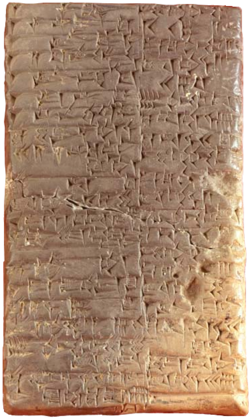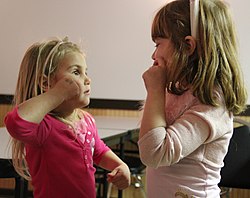Portal:Language
Introduction




Language is a structured system of communication that consists of grammar and vocabulary. It is the primary means by which humans convey meaning, both in spoken and signed forms, and may also be conveyed through writing. Human language is characterized by its cultural and historical diversity, with significant variations observed between cultures and across time. Human languages possess the properties of productivity and displacement, which enable the creation of an infinite number of sentences, and the ability to refer to objects, events, and ideas that are not immediately present in the discourse. The use of human language relies on social convention and is acquired through learning.
Estimates of the number of human languages in the world vary between 5,000 and 7,000. Precise estimates depend on an arbitrary distinction (dichotomy) established between languages and dialects. Natural languages are spoken, signed, or both; however, any language can be encoded into secondary media using auditory, visual, or tactile stimuli – for example, writing, whistling, signing, or braille. In other words, human language is modality-independent, but written or signed language is the way to inscribe or encode the natural human speech or gestures.
Depending on philosophical perspectives regarding the definition of language and meaning, when used as a general concept, "language" may refer to the cognitive ability to learn and use systems of complex communication, or to describe the set of rules that makes up these systems, or the set of utterances that can be produced from those rules. All languages rely on the process of semiosis to relate signs to particular meanings. Oral, manual and tactile languages contain a phonological system that governs how symbols are used to form sequences known as words or morphemes, and a syntactic system that governs how words and morphemes are combined to form phrases and utterances.
The scientific study of language is called linguistics. Critical examinations of languages, such as philosophy of language, the relationships between language and thought, how words represent experience, etc., have been debated at least since Gorgias and Plato in ancient Greek civilization. Thinkers such as Jean-Jacques Rousseau (1712–1778) have argued that language originated from emotions, while others like Immanuel Kant (1724–1804) have argued that languages originated from rational and logical thought. Twentieth century philosophers such as Ludwig Wittgenstein (1889–1951) argued that philosophy is really the study of language itself. Major figures in contemporary linguistics include Ferdinand de Saussure and Noam Chomsky. (Full article...)
Selected language -

Catalan (català) is a Western Romance language. It is the official language of Andorra and the official language of three autonomous communities in eastern Spain: Catalonia, the Balearic Islands and the Valencian Community, where it is called Valencian (valencià). It has semi-official status in the Italian municipality of Alghero, and it is spoken in the Pyrénées-Orientales department of France and in two further areas in eastern Spain: the eastern strip of Aragon and the Carche area in the Region of Murcia. The Catalan-speaking territories are often called the Països Catalans or "Catalan Countries".
The language evolved from Vulgar Latin in the Middle Ages around the eastern Pyrenees. It became the language of the Principality of Catalonia and the kingdoms of Valencia and Mallorca, being present throughout the Mediterranean as the main language of the Crown of Aragon. It was replaced by Spanish as a language of government and literature in the 1700s, but nineteenth century Spain saw a Catalan literary revival, culminating in the early 1900s. With the end of Franco dictatorship (1975) and its repressive measures against the language, Catalan entered a relatively successful process of re-normalization between the 1980s and the 2000s. However, during the 2010s, it experienced signs of decline in social use, diglossia and the re-growth of discrimination cases. (Full article...)
Did you know (auto-generated)

- ... that Weltdeutsch was a proposal for a German-based language by Nobel-Prize laureate and pacifist Wilhelm Ostwald, created in an episode of chauvinistic fervour?
- ... that Polish Renaissance poet Jan Kochanowski – considered "the founding father of Polish literature" – wrote threnodies, the first Polish-language tragedy, and epigrams?
- ... that Czech industrialist Jan Felkl founded a company in 1854 that would produce globes in 17 languages?
- ... that The Seoul Press was an English-language newspaper created to justify Japan's colonial rule of Korea?
- ... that the Brazilian social media page Tupinizando is dedicated to the promotion of Old Tupi, a dead language?
- ... that the literary magazine Adabijoti Soveti was the sole remaining publication in the Jewish-Bukharian language by the time of the switch to the Cyrillic script in 1939–1940?
More did you know -
- ...that most of the 8,000 speakers of the Niuean language live outside the borders of Niue?
- ...that hundreds of words still in use today, including accident, cinnamon, desk, scissors, vacation, and Valentine, first appear in manuscripts written by Geoffrey Chaucer in the 1300s?
- ...that the Jru' language, an indigenous language of Laos, was once written in a secret script?
- ...that during the filming of The Linguists in the Andes, the cast coped with altitude sickness by drinking coca leaf tea?
Categories
Linguistics: Computational linguistics • Grammar • Historical linguistics • Morphology • Phonetics • Phonology • Pragmatics • Reading • Semantics • Sociolinguistics • Syntax • Writing
Languages: Language families • Pidgins and creoles • Sign languages
Linguists: By nationality • Historical linguists • Morphologists • Phoneticians • Phonologists • Sociolinguists • Syntacticians • Translators
Stubs: Constructed languages • Languages • Linguists • Pidgins and creoles • Typography • Vocabulary and usage • Writing systems
Full Language category tree
|
|---|
|
Select [►] to view subcategories
|
Related portals
Selected topic -

Irish phonology varies from dialect to dialect; there is no standard pronunciation of Irish. Therefore, this article focuses on phenomena shared by most or all dialects, and on the major differences among the dialects. Detailed discussion of the dialects can be found in the specific articles: Ulster Irish, Connacht Irish, and Munster Irish.
Irish phonology has been studied as a discipline since the late 19th century, with numerous researchers publishing descriptive accounts of dialects from all regions where the language is spoken. More recently, Irish phonology has been a focus of theoretical linguists. (Full article...)
Selected picture -

The Phoenician alphabet was a non-pictographic consonantal alphabet, or abjad. It became one of the most widely used writing systems, spread by Phoenician merchants across the Mediterranean world, where it evolved and was assimilated by many other cultures. The Aramaic alphabet, a modified form of Phoenician, was the ancestor of modern Arabic script, while Hebrew script is a stylistic variant of the Aramaic script. The Greek alphabet (and by extension its descendants such as the Latin, the Cyrillic and the Coptic), was a direct successor of Phoenician, though certain letter values were changed to represent vowels.
Language News
- 13 December 2025 – Middle Eastern crisis
- An attacker identified by the United States Central Command as a member of ISIL opens fire on a joint Syrian and American convoy in Palmyra, killing two U.S. service members and one American civilian interpreter and injuring three others, before being killed by return fire. (SANA via Al Jazeera)
- 29 September 2025 – Hungary–Ukraine relations, Telecommunications in Hungary
- Hungary blocks access to 12 Ukrainian news websites to reciprocate Ukraine's earlier ban on several Hungarian-language portals. (Reuters)
- 5 September 2025 – Anglophone Crisis
- A roadside bomb kills seven Cameroonian soldiers in the Southwest Region. An English-speaking separatist group claims responsibility for the bombing. (ABC News)
Topics

Languages of Africa: Arabic, Chadic, Cushitic, Kanuri, Maasai, Setswana, Swahili, Turkana, Xhosa, Yoruba, Zulu, more...
Languages of the Americas: Aleut, Carib, Cherokee, Inuktitut, Iroquois, Kootenai, Mayan, Nahuatl, Navajo, Quechuan, Salish, American Sign Language, more...
Languages of Asia: Arabic, Assamese, Balochi, Bengali, Chinese, Japanese, Hajong, Hebrew, Hindustani, Kannada, Kokborok, Marathi, Khasi, Korean, Kurdish, Malayalam, Manipuri, Meithei, Mongolian, Persian, Rajasthani, Sindhi, Sanskrit, Sylheti, Tamil, Tanchangya, Tulu, Telugu, Tibetan, Thai, Turkish, Vietnamese, Khowar, more...
Languages of Austronesia: Austric, Fijian, Hawaiian, Javanese, Malagasy, Malay, Maori, Marshallese, Samoan, Tahitian, Tagalog, Tongan, Auslan, more...
Languages of Europe: Basque, Czech, Danish, Dutch, English (book), French, German, Greek, Italian, Latin, Leonese, Norwegian, Polish, Portuguese, Romanian, Russian, Slovak, Spanish, Ukrainian more...
Constructed languages: Esperanto, Ido, Volapük, more...
Agglutinative language, Analytic language, Constructed language, Creole, Context-free language, Extinct language, Dialect, Fusional language, Inflectional language, International language, Isolating language, Language isolate, National language, Natural language, Pidgin, Pluricentric language, Polysynthetic language, Proto-language, Sign language, Spoken language, Synthetic language, Variety (linguistics)

Applied linguistics, Cognitive linguistics, Accent (dialect), Computational linguistics, Descriptive linguistics, Eurolinguistics, Generative linguistics, Historical linguistics, Lexicology, Lexical semantics, Morphology, Onomasiology, Phonetics, Phonology, Pragmatics, Prescription, Prototype semantics, Psycholinguistics, Semantics, Stylistics, Sociolinguistics, Syntax
See also: List of linguists

Alphabets: Arabic alphabet, Bengali alphabet, Cyrillic alphabet, Hebrew alphabet, Latin alphabet, more...
Other writing systems: Abjad, Abugida, Braille, Hieroglyphics, Logogram, Syllabary, SignWriting, more..
See also: History of the alphabet, Script
Associated Wikimedia
The following Wikimedia Foundation sister projects provide more on this subject:
-
Commons
Free media repository -
Wikibooks
Free textbooks and manuals -
Wikidata
Free knowledge base -
Wikinews
Free-content news -
Wikiquote
Collection of quotations -
Wikisource
Free-content library -
Wikiversity
Free learning tools -
Wiktionary
Dictionary and thesaurus
Find a language
| Enter an ISO 639 code to find the corresponding language article |












